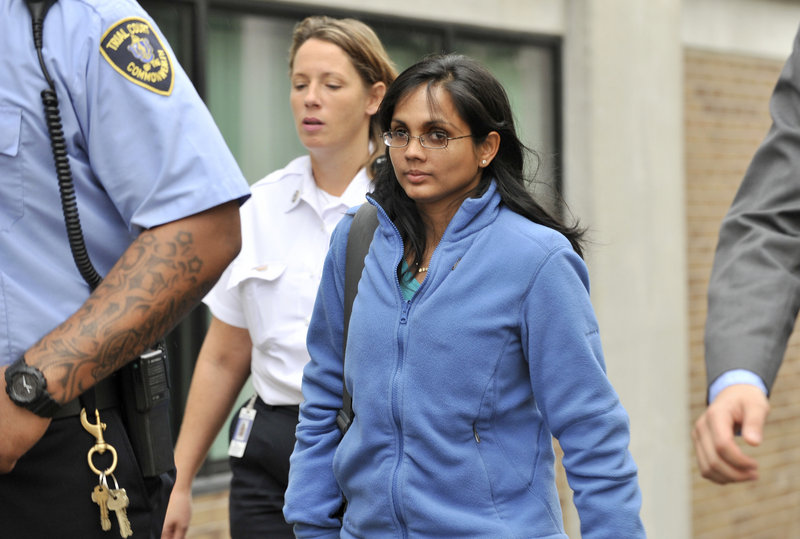BOSTON — As a girl and young woman, Annie Dookhan was quiet and unassuming. She was charming but stood out more for her dedication to her studies, and by all accounts seemed headed for success.
The only child of hard-working immigrant parents, she enjoyed their pride as she glided through a prestigious Boston prep school, graduated from college with a degree in biochemistry and appeared to be on a track to medical school.
Now, as she takes center stage in a shocking scandal that has sent the Massachusetts legal system into a tailspin, those familiar with her from school and work are struggling to reconcile the Annie Dookhan they knew with the chemist accused of falsifying criminal drug tests.
“I find it hard to believe that she was an individual who decided to falsify lab results … that she would turn into someone who did something like that. … That isn’t the person I remember,” said John Warner, an instructor who gave her A’s and A-minuses in 2000 when she took his biochemistry class as a senior at the University of Massachusetts-Boston.
“Obviously, things can happen to people,” he said. “Either something happened in her life that changed the person that she is, or this is a deeper story.”
Dookhan’s struggle with both personal and professional problems in 2009 — including a miscarriage and a legal ruling that put new pressures on chemists at the lab — may help offer an explanation, one former co-worker said.
“Perhaps she was trying to be important by being the go-to person,” Elizabeth O’Brien told state police, who shut down the lab in August after discovering the extent of Dookhan’s alleged mishandling of drug samples sent to the lab by local police departments.
In her own interview with police, Dookhan said she had not tested all the drugs she claimed she did, forged initials of her co-workers, and sometimes mixed drug samples to cover her tracks.
“I messed up bad; it’s my fault. I don’t want the lab to get in trouble,” she said, according to a state police report.
She faces as many as 20 years in prison on obstruction of justice charges. More than two dozen drug defendants are already back on the streets as authorities scramble to figure out how to handle the cases of more than 1,100 inmates whose cases Dookhan handled.
State police say Dookhan tested more than 60,000 drug samples involving 34,000 defendants during her nine years at Hinton State Laboratory Institute in Boston.
Until recently, she had a reputation for diligence and hard work.
Born in the Caribbean nation of Trinidad and Tobago, Dookhan moved to the United States with her parents as a child and spent part of her youth in a working-class neighborhood in Stoughton, about 20 miles south of Boston. She later became a naturalized U.S. citizen.
Neighbors knew Dookhan, then Annie Khan, as a quiet teenager whose parents liked to share stories of her academic success.
“She seemed like an overachieving sort of kid,” said Frank Clark, who lived down the street in the 1990s.
Authorities so far can’t find a motive for Dookhan’s actions other than she wanted to be seen as a good worker, state Attorney General Martha Coakley has said.
But being a good worker became more complicated at the Hinton lab a few years back.
In 2009, a U.S. Supreme Court decision known as Melendez-Diaz grew out of a Boston drug case that said defendants had the right to cross-examine chemists in court who had prepared prosecution reports against them.
The decision meant chemists, including Dookhan, had to spend more time in court and less in the lab to keep up with the demands of the justice system.
“Annie was going through personal problems, then court, and Melendez-Diaz was tough at first on her,” O’Brien, the co-worker, told state police.
Dookhan already had a reputation as the most productive chemist at the lab, logging such a high volume of samples that colleagues started questioning her work about four years ago.
In 2010, supervisors did a paperwork audit of her work but didn’t retest any of her samples. They didn’t find problems.
Dookhan had to send a resume to prosecutors whenever she testified in criminal cases. In 2010, O’Brien caught Dookhan padding her resume by claiming she had a master’s degree in chemistry from the University of Massachusetts.
She took it off her resume but later put it back on, O’Brien told police.
In August, another Hinton chemist told investigators her own monthly sample testing volume dropped from about 400 to 200 after Melendez-Diaz, but talk around the lab was that Dookhan was testing 800 a month.
Send questions/comments to the editors.



Success. Please wait for the page to reload. If the page does not reload within 5 seconds, please refresh the page.
Enter your email and password to access comments.
Hi, to comment on stories you must . This profile is in addition to your subscription and website login.
Already have a commenting profile? .
Invalid username/password.
Please check your email to confirm and complete your registration.
Only subscribers are eligible to post comments. Please subscribe or login first for digital access. Here’s why.
Use the form below to reset your password. When you've submitted your account email, we will send an email with a reset code.